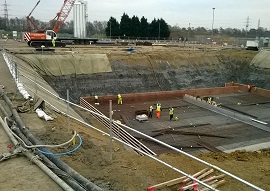Geotechnical engineering
Geotechnical engineering is a practice that relates to the engineering behaviour of the earth and its materials. As a branch of civil engineering it is of great importance to construction activities taking place on the surface or within the ground, as well as to mining, coastal, drilling and other disciplines.
Despite having considerable overlap, geotechnical engineering differs from engineering geology in that it is a speciality of engineering, whereas the latter is a speciality of geology.
Geotechnical engineers are responsible for evaluating subsurface and soil conditions and materials, using the principles of soil and rock mechanics. They are commonly appointed as consultants on construction projects. Engineers also examine environmental issues such as flood plains and water tables. By doing so, they are able to determine whether a particular site is suitable for a proposed project, and can inform the engineering design process with regard to how ground conditions can be made safe and effective for construction.
From geotechnical surveys, engineers will be able to evaluate the stability of the ground, including any slopes and soil deposits, assess any risks and/or contamination, and help to determine the types of foundations and earthworks that will be required. The potential for hazards such as landslides, earthquakes and other seismic activity can also be assessed.
Geotechnical engineers can be involved in ‘ground improvement’, in which soil is treated through a variety of different techniques to improve strength, stiffness, and/or permeability.
Geotechnical engineering is also important in coastal and ocean engineering, in relation to building wharves, jetties, marinas and coastal defences, as well as foundation and anchor systems for offshore structures such as oil rig platforms. Engineers may also work on embankments, tunnels, channels, reservoirs, irrigation systems, and so on.
NB Roles in construction projects: analysis and terminology, by Hughes, W. and Murdoch, J. R, published in 2001 by the University of Reading, defines a geotechnical engineer or geotechnic engineer as a: ‘Consultant with specific responsibility for contributing advice and information on aspects connected with conditions below the surface of the ground.’
[edit] Related articles on Designing Buildings
Featured articles and news
A case study and a warning to would-be developers
Creating four dwellings... after half a century of doing this job, why, oh why, is it so difficult?
Reform of the fire engineering profession
Fire Engineers Advisory Panel: Authoritative Statement, reactions and next steps.
Restoration and renewal of the Palace of Westminster
A complex project of cultural significance from full decant to EMI, opportunities and a potential a way forward.
Apprenticeships and the responsibility we share
Perspectives from the CIOB President as National Apprentice Week comes to a close.
The first line of defence against rain, wind and snow.
Building Safety recap January, 2026
What we missed at the end of last year, and at the start of this...
National Apprenticeship Week 2026, 9-15 Feb
Shining a light on the positive impacts for businesses, their apprentices and the wider economy alike.
Applications and benefits of acoustic flooring
From commercial to retail.
From solid to sprung and ribbed to raised.
Strengthening industry collaboration in Hong Kong
Hong Kong Institute of Construction and The Chartered Institute of Building sign Memorandum of Understanding.
A detailed description from the experts at Cornish Lime.
IHBC planning for growth with corporate plan development
Grow with the Institute by volunteering and CP25 consultation.
Connecting ambition and action for designers and specifiers.
Electrical skills gap deepens as apprenticeship starts fall despite surging demand says ECA.
Built environment bodies deepen joint action on EDI
B.E.Inclusive initiative agree next phase of joint equity, diversity and inclusion (EDI) action plan.
Recognising culture as key to sustainable economic growth
Creative UK Provocation paper: Culture as Growth Infrastructure.























Comments
Rabio Vegetariano